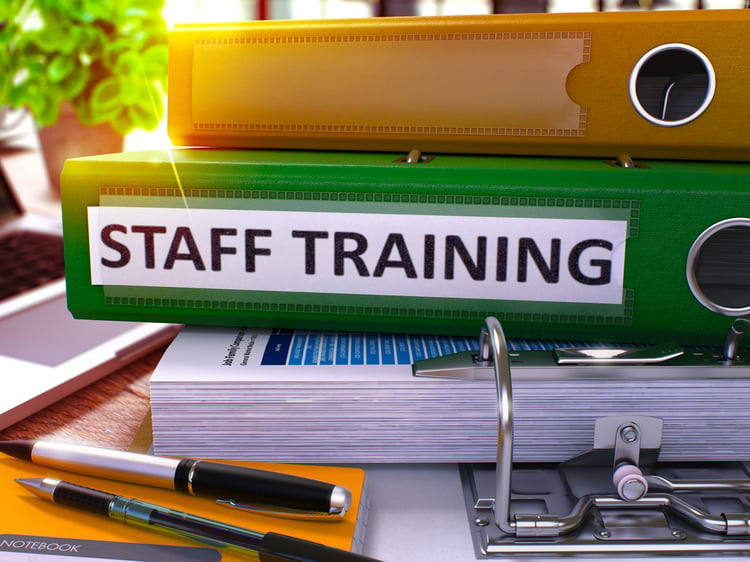As a self storage owner, you know the importance of training for staff and management. However, a lack of time or money may lead you to put self storage training on the back burner. Unfortunately, this can lead to dissatisfied employees which increases the odds of them seeking employment elsewhere. With proper self storage training, however, employees gain new skills, perform their job better, and become more productive. This leads to happier customers and more sales.
5 Benefits of Self Storage Training
Before delving into how to train self storage employees, let’s take a closer look at the top five benefits of an effective self storage training program for your employees.

1. Start New Hires Off Right
You don’t want to just throw new self storage employees to the wolves, but that’s exactly what many companies are doing. A Global Leadership Survey found that more than 55% of employees are not prepared for their new jobs due to a lack of planned and consistent career development training.
With proper self storage training early on, you can get your staff up to speed with your facility’s policies and processes. It’s also a chance to fill in any knowledge gaps; after all, just about every new hire will have some deficiencies and this is to be expected. Through self storage training, you can iron out weaknesses by amplifying each employee’s strengths and providing them with new skills that improve performance.

2. Reduce Turnover
Employee retention rates in all industries are at an all-time low, with people leaving their current positions in search of better opportunities. That’s bad news for any company, with studies showing that better retention rates could boost profits up to four times.
The good news is that retention rates rise 30-50% for companies with strong learning cultures; in addition, 86% of millennials – the largest working generation in the United States – state they would be less likely to leave their current position if training and development were offered by their employer.
3. Improve Productivity
Many of today’s self storage facilities are investing in new technology, such as Reputation Management Software (RMS) for managing online evaluations, Smart Entry Technology for automated, contactless experiences, Global Distribution Systems (GDS) for renting units, and Customer Relationship Management (CRM) systems to manage tenant interactions.
However, it’s important to continue to train self storage employees on this new self storage technology to be sure they transition to the new tools and services and discard outdated methods they may be using. This will improve their efficiency, and in turn, their productivity at your self storage business.
The National Center on the Educational Quality of the Workforce (EQW) found that on average, a 10% increase in the value of technology or equipment increased productivity by about 3.5%. That’s great, but get this: A 10% increase in training levels on this technology or equipment led to about an 8.5% gain in total productivity. So, while adopting new tech is important, training staff on its use is critical.

4. Increase Employee Satisfaction
Investing in professional growth through training leads to more satisfied employees as they become more confident and proficient in their position at your self storage facility. Just be sure the training you provide can be applied to their job; training that is considered irrelevant will not resonate with them, or be useful.
While self storage is considerably different from fast food, consider this: QSR reports that Chick-fil-A ranked above all fast-food competitors on both revenue per restaurant and the politeness of the staff. Analysts agree that these stellar rankings can be attributed to a high-level customer service, which Chick-fil-A credits to investing in its employees through training.

5. Increase Customer Satisfaction
According to Forbes, the key to achieving customer happiness – as in customers who want to do business with your self storage facility again and again – is to focus on employee happiness first. “It’s simple — happier employees make happier customers,” the outlet states.
Statistics back this up; Gallup reports in “The State of the American Workplace” that employees who are engaged are more likely to improve customer relationships, with a resulting 20% increase in sales. This applies to the self storage industry, too!

How To Train Your Self Storage Staff
What’s the best method for training your self storage employees? What type of training program will be offered? How long should training last?
While some of this will be determined by your resources (how much money, time, and people you have to invest) and the number of self storage properties you own, there are a number of options to consider.
Training Options For Employees at Your Self Storage Business
Popular training options in the self storage industry include:
- Conducting the self storage training on your own
- Designating a strong company employee as a trainer/mentor, such as a qualified storage manager
- Assembling a team of trainers based on the strengths and skills of existing staff
- Hiring a third-party training company for on-site training
- Investing in online training programs
When self storage employee training begins, the topics and skills need to be relevant to participants and aligned with current business goals (for maximum relevancy, management and general staff training may occur separately). The lessons learned must be timely and applicable to specific jobs within the company, with quick takeaways that can immediately be applied to each employee's ongoing duties.
Employee Training Manuals
It’s also recommended that you have a well-written employee manual (especially for self storage manager training) for your self storage business. This guide should include descriptions of everything self storage management and staff will need to know.

Considerations for your self storage training manual include:
- Business overview: Why people use self storage, tenant expectations, what makes your property different from the competition.
- Job responsibilities: An overview of the various roles and responsibilities. Include ownership expectations for each position as well (occupancy and income goals, expense control, customer retention, etc).
- Daily operations: Opening and closing the office, renting and vacating space, conducting lock/security checks, preparing bank deposits, etc.
- Management software/technology: Taking payments, renting and vacating space, running reports, renting trucks, inputting sales-lead information.
- Sales: Answering the phone, monitoring website inquiries, lead follow-up, researching competitor properties.
- Collections: Gathering tenant information, communicating with tenants, and understanding the lien process.
- Ancillary products and services: Management of other services/items your facility provides (retail merchandise, truck rentals, boat/RV storage, etc).
- Maintenance: Unit cleaning, curb appeal, changing out signage, etc.
- Marketing: Methods, tracking, follow-up, referrals, reporting, budgeting.
Ongoing Training for Self Storage Employees
You might think once you’ve trained your staff, you’re done. But, training isn’t a “set it and forget it” thing. New hires must be trained, and ongoing training should continue for existing staff at your self storage facilities. This is important because what we learn tends to fade over time. The key to knowing when it’s time for a “refresher course” is to monitor employees and their performance.
Questions For Self Storage Managers to Ask
- Are you noticing mistakes?
- Is technology not being properly used?
- Are you seeing more customer complaints online?
- Has there been safety- or security-related incidents?
- Are occupancy goals not being achieved?
If you can answer yes to some or all of these questions, it’s a clear sign that it’s time for another round of training. Your refresher course should touch on the basics once again, and provide an opportunity for learners to absorb any new information. You might simply consider a quarterly training course to keep employee skills honed, inform them of self storage facility successes and challenges, and update them on any new developments in the self storage industry.
Pro Tip: Training is an investment, so you want to be sure it’s effective. This means asking employees for feedback about the training experience. You can ask what they found most valuable, what they would like to learn more about in the future, and so on. You can collect this feedback through online surveys like SurveyLegend.

Self Storage Training Resources
Need help with self storage training? There are a couple of resources available to self storage managers.
- Self Storage Association: Certified Self Storage Manager Training. The Self Storage Association’s Certified Self Storage Manager (CSSM©) Program is a 15-session course designed to give self storage managers an understanding of the most important aspects of the job.
- Storelocal Consulting. Storelocal Consulting offers training insight and information tailored to a variety of self-storage jobs and tasks, including self storage management and owner training, software conversion, marketing, sales techniques, lien sales/auctions, competition analysis, and pricing. Storelocal Consulting can also provide the all-important employee manual to get your team ready for anything.
Neglecting to train employees to succeed in their new position can be a crucial mistake. Robert Kelly of Carnegie Mellon says, “[Not being trained] is an experience all too familiar to new managers. Companies call it ‘on-the-job training,’ but it’s really trial by fire.” Make sure your management team and staff have the proper training, and you’ll be setting yourself up for self storage success!
